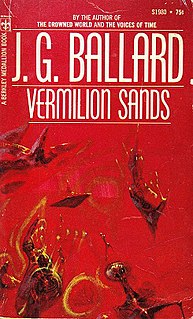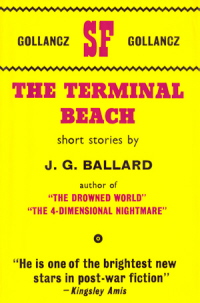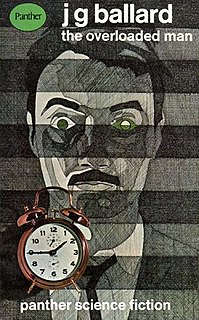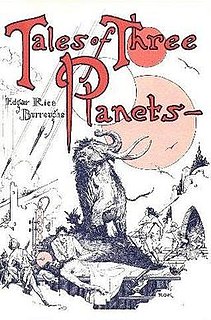
James Graham Ballard was an English novelist, short story writer, satirist, and essayist known for provocative works of fiction which explored the relations between human psychology, technology, sex, and mass media. He first became associated with the New Wave of science fiction for post-apocalyptic novels such as The Drowned World (1962), but later courted controversy for works such as the experimental short story collection The Atrocity Exhibition (1970), which included the 1968 story "Why I Want to Fuck Ronald Reagan", and the novel Crash (1973), a story about a renegade group of car crash fetishists.

Peter Francis Straub is an American novelist and poet. He has written numerous horror and supernatural fiction novels, including Julia and Ghost Story, as well as The Talisman, which he co-wrote with Stephen King. Straub has received such literary honors as the Bram Stoker Award, World Fantasy Award, and International Horror Guild Award.

Venus and Adonis is a narrative poem by William Shakespeare published in 1593. It is probably Shakespeare's first publication.

Vermilion Sands is a collection of science fiction short stories by British writer J. G. Ballard, first published in 1971. All the stories are set in an imaginary vacation resort called Vermilion Sands which suggests, among other places, Palm Springs in southern California. The characters are generally the wealthy and disaffected, or people who make a living off them, as well as parasites of various kinds.

Myths of the Near Future is a collection of science fiction short stories by British writer J. G. Ballard, first published in 1982.

The Terminal Beach is a collection of science fiction short stories by British author J. G. Ballard, published in 1964.

The Four-Dimensional Nightmare, also known as Voices of Time, is a collection of science fiction short stories by British writer J. G. Ballard, published in 1963 by Victor Gollancz.

The Overloaded Man is a collection of science fiction stories by British writer J. G. Ballard, first published in 1967 as a paperback by Panther Books.
Jove Books, formerly known as Pyramid Books, is an American paperback and eBook publishing imprint, founded as an independent paperback house in 1949 by Almat Magazine Publishers. The company was sold to the Walter Reade Organization in the late 1960s. It was acquired in 1974 by Harcourt Brace which renamed it to Jove in 1977 and continued the line as an imprint. In 1979, they sold it to The Putnam Berkley Group, which is now part of the Penguin Group.
The Complete Short Stories of J. G. Ballard: Volume 1 is a short story collection by J. G. Ballard, published in 2006.
"The Concentration City" is a dystopian short story by British author J. G. Ballard, first published, under the title "Build-Up", in New Worlds volume 19 number 55 in January 1957. It was reprinted in the collections Billennium and Chronopolis and later, under its revised title, in The Disaster Area and was also included in The Complete Short Stories of J. G. Ballard: Volume 1 and The Complete Stories of J.G. Ballard.
"Venus Smiles" is a short story by British author J. G. Ballard. Originally titled "Mobile", it appeared in the June 1957 edition of Science Fantasy. It was then rewritten and appeared in the Vermilion Sands (1971) collection under its new name and later The Complete Short Stories of J. G. Ballard (2006).
"Track 12" is a short story by British author J. G. Ballard, it first appeared in the April 1958 edition of New Worlds. It then appeared in Penguin Science Fiction in 1961, Passport to Eternity, The Venus Hunters, The Overloaded Man, and later in The Complete Short Stories of J. G. Ballard: Volume 1.

Tales of Three Planets is a posthumous collection of short stories by American writer Edgar Rice Burroughs, with an introduction by Richard A. Lupoff and illustrations by Roy G. Krenkel. It was first published in hardcover in 1964 by Canaveral Press, and has been reprinted once since.
"Studio 5, The Stars" is a short story by British author J. G. Ballard. First appearing in the February 1961 edition of Science Fantasy ; it was reprinted in the collection Billennium the following year. It later appeared in The Four-Dimensional Nightmare (1964), Vermilion Sands (1971) and The Complete Short Stories of J. G. Ballard (2006).
"Mr F. is Mr F." is a short story by British author J. G. Ballard. It first appeared in the August 1961 edition of Science Fantasy. It was later reprinted in The Disaster Area (1967), and then in the larger The Complete Short Stories of J. G. Ballard: Volume 1 anthology (2006).
"Minus One" is a short story by British author J. G. Ballard; it was first published in the June 1963 edition of Science Fantasy. It was later reprinted in the 1967 collection The Disaster Area, and then later in the larger The Complete Short Stories of J. G. Ballard: Volume 1 anthology (2006).
"The Sound-Sweep" is a short story by British writer J.G. Ballard. It was first published in Science Fantasy, Volume 13, Number 39, February 1960 and was reprinted in the collection The Four-Dimensional Nightmare.

Chronopolis and Other Stories is a 1971 collection of science fiction stories by British writer J. G. Ballard. Originally published in the United States by Putnam, it was reprinted in paperback in 1972 by Berkley Books, under the title Chronopolis, subtitled "The Science Fiction of J. G. Ballard."

The Pardo Venus is a painting by the Venetian artist Titian, completed in 1551 and now in the Louvre Museum. It is also known as Jupiter and Antiope, since it seems to show the story of Jupiter and Antiope from Book VI of the Metamorphoses. It is Titian's largest mythological painting, and was the first major mythological painting produced by the artist for Philip II of Spain. It was long kept in the Royal Palace of El Pardo near Madrid, hence its usual name; whether Venus is actually represented is uncertain. It later belonged to the English and French royal collections.











